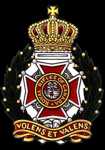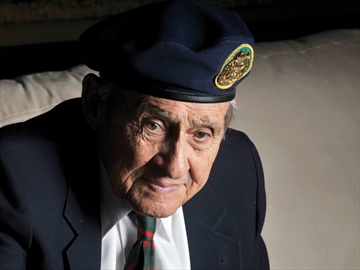|

Bruce Cadoret

Royal Rifles of Canada
Japanese PoW
Captured Hong Kong
Liberated Japan
Died
October 2015
Second World War Veteran Awarded Queen’s Diamond Jubilee Medal
by
Karen Longwell / Northumberland
Northumberland News
COBOURG -- Second World War veteran and survivor of a Japanese prison camp Bruce Cadoret died peacefully in Cobourg October 2015.
Mr. Cadoret died at the age of 93 in Northumberland Hills Hospital. Originally from Gaspe, Quebec, Mr. Cadoret lived in Cobourg during his golden years. He spent nearly four years as a Japanese prisoner of war during the Second World War and was recognized for his service to Canada with Queen’s Diamond Jubilee Medal in August 2012.
Speaking to the Northumberland News in 2012, Mr. Cadoret said he was 18 years old when he joined the Royal Rifles of Canada in 1941. Shortly afterward, he and his fellow recruits endured two weeks onboard a ship, with no idea where they were headed. The Royal Rifles of Canada, along with Manitoba’s Winnipeg Grenadiers -- 1,975 men -- landed in Hong Kong, then a Crown colony, on Nov. 16, 1941 to help reinforce the Hong Kong garrison. On Dec. 8, 1941, eight hours after the Pearl Harbor bombing, the Japanese attack on Hong Kong began. The Canadian troops, outmanned and outgunned, held out for 17 days until Christmas Day, referred to as ‘Black Christmas’, when British colonial officials surrendered Hong Kong to the Japanese. Of the original troop complement, there were 1,418 survivors taken prisoner, he noted.
In captivity, Mr. Cadoret endured brutal conditions, he said.
‘We were told we were slaves of the Japanese Empire,’ said Mr. Cadoret. ‘Slaps across the face, fed dirty rice scraped off the floor with cigarette butts and dirt in it for every meal, the fleas, the bedbugs. I’d get in my bunk and start burning from head to toe from the bedbugs .’
At first, Mr. Cadoret said he couldn’t eat the filthy slop but starvation soon took hold.
‘We actually thought about eating the heels off our boots,’ he recalled. ‘I’d been hungry before, but never like I was then.’
The Canadian prisoners of war were then transported by boat and rail to Japan, forced to work long days in the coal mines.
‘All we wore was a G-string and a pair of rubber-soled running shoes,’ he said. ‘And we were always filthy black from coal dust.’
Mr. Cadoret credited his will to survive to his stubborn nature.
‘I felt, I’m just as stubborn as you (captors) are’ he recalled. ‘I set my mind to do everything I had to get out and go home. I never gave up.’
He was released in August of 1945, when Americans liberated the camp. Mr. Cadoret weighed 150 pounds when taken prisoner: after three years and eight months in enemy hands, he dropped to 108.
He recalled returning to normal life was hard. However, he noted his prisoner-of-war experience helped him appreciate life back home all the more. And an introduction to Rena Doody, the 19-year-old daughter of one of his former prison camp mates, Irwin Doody, who lived down the way from his home, began a new chapter in his life.
‘One look at Rena and that was that,’ said Mr. Cadoret. The couple married and raised three children -- two boys and a girl.
Rena Cadoret died in November 2012.
Mr. Cadoret told his story for the Memory Project, a nationwide bilingual project that connects veterans and Canadian forces personnel with the opportunity to share their stories. Mr. Cadoret’s story can be seen online at:-
www.thememoryproject.com/stories/3249:bruce-cadoret
|